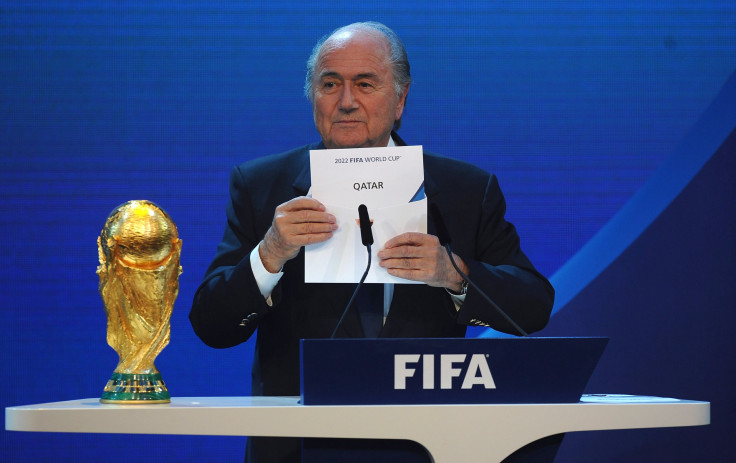FIFA Under Former President João Havelange Was Involved In Corruption Long Before Sepp Blatter's Presidency

When U.S. Attorney General Loretta Lynch announced during a press conference from the Eastern District court of New York on Wednesday that nine FIFA officials and five people associated with the Swiss-based organization were being indicted on 46 criminal counts going back to 1991, it’s unlikely that anyone observing the controversial and seemingly untouchable organization over the last 24 years would be surprised. Since Sepp Blatter took office in 1998, tales of top soccer officials involving themselves in widespread bribery, vote rigging and blackmail have been widely reported in the press.
What many don't know is that FIFA officials were receiving bribes long before Blatter became president. According to Swiss court documents released in 2011, former FIFA president João Havelange, who served from 1974 to 1998, and his stepson Ricardo Teixeira (a former FIFA official and former president of the Brazilian football federation) received around $42 million in bribes between 1992 and 2000 from a marketing company in exchange for FIFA broadcasting rights.
Havelange's involvement with the marketing company began in 1982, a full 16 years before Blatter ascended to the top of FIFA.
Swiss sports marketing company International Sport and Leisure (ISL) was established at the beginning of the '80s to sell the broadcasting rights for FIFA events, such as World Cups, to broadcasters around the world. They'd buy the rights from FIFA and sell them for a profit. The man at the helm of ISL at the time was Horst Dassler, heir to the Adidas empire and close friend of Havelange, who also happened to be a respected Brazilian football administrator, former Olympian and powerful member of the International Olympic Committee (IOC).
At that time, FIFA was not financially viable and wasn't making profits from any of its events. The world soccer governing body even had to ask Adidas to underwrite its $8 million expenses for the 1978 Argentina World Cup. However, during the 1980s, with ISL firmly established, the profits started to add up.
By 1987 the European TV rights to the next three FIFA World Cups were sold for $440 million. Those included the 1990, 1994 and 1998 events. The non-U.S. rights for the three tournaments from 1998 sold for $2.2 billion. The money at the time was split between FIFA and ISL.
But accusations that Havelange took bribes didn't initially involve his time at FIFA. It was while serving as a member of the IOC, a position he held from 1963 to 2011, that the first fingers were pointed.
In 1999, a prominent Dutch newspaper reported that Havelange had accepted a number of gifts from the Amsterdam Olympic bidding team, including diamonds worth tens of thousands of dollars.
"I remember it very well because he had special wishes, wishes which were in conflict with the IOC laws," said Peter Kronenberg, who headed the press office of the Amsterdam Olympic Games 1992 Foundation, to CNN in 1998.
IOC laws prohibit the giving of gifts to committee members, but the accusations against Havelange were never fully investigated.
While under IOC investigation in 2011 for reports that he’d received $1 million in bribes from ISL, Havelange stepped down from his position and the investigation was formally ended.
But the extent of Havelange’s alleged corrupt dealings while at FIFA, which go back as far as 1992, were not fully revealed until 2010, eight years after the marketing company that he was alleged to have taken bribes from went bankrupt with debts of $180 million.
It was during a fraud trial that began in 2008 that ISL's accounting was first scrutinized by investgators. Court documents showed that ISL paid nearly $200 million in "personal commissions" to sports officials and other people involved in the marketing of broadcast sports rights between 1989 and 2000. A judge referred to the commissions as bribes. But the fraud trial was ended without prosecution after an anonymous source paid a $5.6 million fine that was accepted by the court.
By 2010, Havelange and Teixeira's names had been leaked as the recipients of some of the bribes.
Despite evidence against both men, neither faced trial. They ended up paying $525,000 and $2.6 million, respectively, to the liquidators of ISL to ensure that neither went to trial. The sums paid were considered reasonable given that the statute of limitations in Switzerland had elapsed and that Havelange was more than 90 years old.
A 2013 FIFA investigation into the alleged bribes paid to Havelange and Teixeira concluded that both were guilty and accused former FIFA executive member Nicolas Leoz of also receiving cash from the defunct marketing company.
"It is certain that not inconsiderable amounts were channeled to former FIFA president Havelange and to his son-in-law Ricardo Teixeira as well as to Dr. Nicolas Leoz [President of South America's football governing body, CONMEBOL], whereby there is no indication that any form of service was given in return,” noted the report.
Since then FIFA has hired former New York district Attorney Michael Garcia, now of the New York-based Kirkland law firm, to investigate all allegations against it, including claims of bribery and vote rigging during the selection of the 2018 and 2022 World Cup, which went to Russia and Qatar, respectively.
The full report has never been released, although FIFA did offer a summary of its findings, which suggested FIFA officials had not committed any wrongdoing in the buildup to the votes for the 2018 and 2022 World Cups. Garcia rejected the summary, saying it was a document of "numerous materially incomplete and erroneous representations of the facts and conclusions.”
While U.S. attorney General Lynch said that the charges against the former FIFA officials and associates spanned “at least two generations of soccer officials,” Havelange and Teixeira are not featured in the indictment that was released Wednesday.
© Copyright IBTimes 2024. All rights reserved.






















